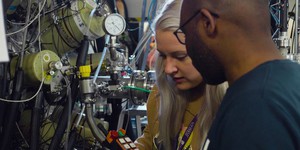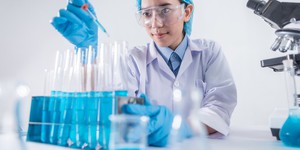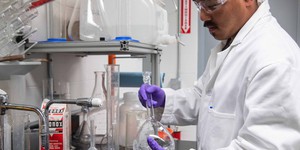Abstract
Can water remain liquid below its normal freezing point? If it does, that water is supercool(-ed). This project shows you a method for supercooling water. You can test water from different sources to see whether or not it can be supercooled.Summary
Andrew Olson, Ph.D., Science Buddies
Sources
This project is based on:
- Heya, R.N. & Mori, Y., 1999. "Supercooling," [accessed March 20, 2007, but no longer available online]
Objective
The goal of this project is to investigate supercooling of water. Supercooling is when water remains liquid below it's normal freezing point of 0°C. Does prior heating of the water make it easier to supercool water without freezing?
Introduction
At what temperature does water freeze? That's easy: 0°C (32°F). Did you know that water can sometimes be cooled below the freezing point and still remain liquid? This is called supercooling.
All matter is made of atoms. The atoms are constantly moving: whizzing around in gases, tumbling around in liquids—even in solid material the atoms are vibrating. The temperature of a piece of matter is a measure of the average motion of the molecules that make up that piece of matter. The lower the temperature, the less molecular motion there is. As the temperature increases, the energy of the molecules increase. When the temperature increases sufficiently, matter can change from solid to liquid or from liquid to gas or from gas to plasma. Each of these states of matter (solid, liquid, gas, plasma) is called a phase of matter. It takes energy to change from one phase to another, energy which is used to alter the chemical bonds between the molecules.
When water freezes, the molecules of liquid become locked in a crystalline array. The molecules in the crystal have less energy than molecules in liquid water. They move less. So in order to go from liquid water to solid ice, water must lose energy.
When water is cooled to its freezing point, ice crystals begin to form and grow in the water. It is thought that these initial crystals often form around impurities in the water. If you start with a sample of pure water, and cool it slowly, you can produce supercooled liquid water. When ice is added to supercooled water, it acts to catalyze the crystallization of the liquid. The water instantly freezes solid. This is sometimes called "snap freezing."
In this project you will use salt and ice to make a "bath" that is below the normal freezing point of water. The dissolved salt causes the bath to have a temperature below the normal freezing point of water. This phenomenon is called freezing point depression. You can use your salt/ice bath to cool various water samples to investigate which samples can be supercooled, and which samples freeze at the normal freezing point. It's fun to see water suddenly freeze solid. Can you figure out conditions for reliably producing supercooled water?
Terms and Concepts
To do this project, you should do research that enables you to understand the following terms and concepts:
- Change of phase
- Freezing
- Heat of fusion
- Heat of vaporization
- Supercooling
- Freezing point depression
Questions
- How does adding salt to ice make it colder?
Bibliography
This project is based on:
- Gregorius, R., Hoff, and V. Calder. (2004). Supercooled Water Demonstration. Ask A Scientist, General Science Archive, Argonne National Laboratory, U.S. Department of Energy. Retrieved March 20, 2007.
- Gourmetsleuth. (2006). Gram Conversion Calculator. Retrieved March 20, 2007.
This animation illustrates the phases of water, from solid to liquid to vapor, as heat is added. Notice when the thermometer rises, and when it stays still:
- Birmingham Grid for Learning. (n.d.). Changing Matter. Birmingham City Council. Retrieved March 28, 2014.
Materials and Equipment
To do this experiment you will need the following materials and equipment:
- Large bowl
- Ice
- Salt
- Distilled water
- Thermometer. A good range would be -20°C to 110°C, e.g. this partial immersion thermometer from Carolina Biological Supply Company
- Transparent plastic cups (tip: a tall, narrow shape works best)
- Piece of cardboard (e.g., empty cereal box)
- Scissors
Disclaimer: Science Buddies participates in affiliate programs with Home Science Tools, Amazon.com, Carolina Biological, and Jameco Electronics. Proceeds from the affiliate programs help support Science Buddies, a 501(c)(3) public charity, and keep our resources free for everyone. Our top priority is student learning. If you have any comments (positive or negative) related to purchases you've made for science projects from recommendations on our site, please let us know. Write to us at scibuddy@sciencebuddies.org.
Experimental Procedure
Procedure for Supercooling Water
- Cut a circle from the cereal box to use as a cover for the plastic cup.
- Pour a small sample of distilled water into a clean plastic cup (enough to fill about 1/4 of the cup) and place the cup in the center of the bowl.
- Cover the cup, then add ice cubes to the bowl, so that the ice is about 2–3 times higher than the level of water in the cup. Be careful not to get any ice inside the cup.
- Sprinkle two tablespoons of salt over the ice cubes. Be careful not to get any salt inside the cup.
- Uncover the cup and put the thermometer inside.
- Monitor the temperature of the water. Over the next 30 minutes or so, you should see the temperature slowly decrease. Keep track of the time and temperature in your lab notebook.
- When the temperature of the water reaches −1 to −3 °C or so, carefully remove the cup from the ice bath.
- Repeat the procedure, testing different types of water to see whether it can be supercooled before freezing. For each type of water, run at least three trials (more is better). Here are some ideas for types of water to test:
- bottled distilled water
- bottled spring water
- plain tap water
- any of the above that have been boiled and then allowed to cool to room temperature.
Snap Freezing Supercooled Water
- Drop a small piece of ice into the cup of supercooled water. What happens?
- How does the temperature change when the water freezes? Can you explain why?
- Tip: to avoid breakage, allow the frozen water to thaw before attempting to remove the thermometer from the cup.
Ask an Expert
Global Connections
The United Nations Sustainable Development Goals (UNSDGs) are a blueprint to achieve a better and more sustainable future for all.
Variations
- Can other materials act as crystallization nuclei for snap freezing?
- What happens if you gently shake the cup of supercooled water?
- Make a movie of the crystal formation process with a video camera and crossed polarizers. See: http://www.fas.harvard.edu/~scdiroff/lds/ThermalPhysics/SupercoolingWater/SupercoolingWater.html.
- Does the rate at which the water cools affect freezing? Can you still supercool water if you cool it more quickly? One way to cool the water faster is to add water to the ice and salt outside the bowl. The water will contact a greater amount of the surface area of the cup than ice alone. A water/ice/salt bath will conduct heat away from the cup more quickly. Fill your bowl about halfway with plain tap water. Dissolve as much salt in the water as you can. Tips:
- The maximum solubility for table salt (NaCl) in water (@ 25°C) is 35.9 g/100 ml.
- From a gram conversion calculator for recipes, 36 g of salt is roughly 2-1/2 tablespoons (Gourmetsleuth, 2006).
- The cup will now be floating in the bowl. You may need to secure the thermometer so that it does not tip the cup over.
- Does the purity of the water affect how it freezes? Can you supercool plain tap water?
- Does water that has been heated and then allowed to cool to room temperature supercool more easily than water fresh from the tap at room temperature?
- Would you expect warm water or cool water to freeze faster with this setup? See the Science Buddies project Investigating the 'Mpemba Effect': Can Hot Water Freeze Faster than Cold Water?.
Careers
If you like this project, you might enjoy exploring these related careers:










